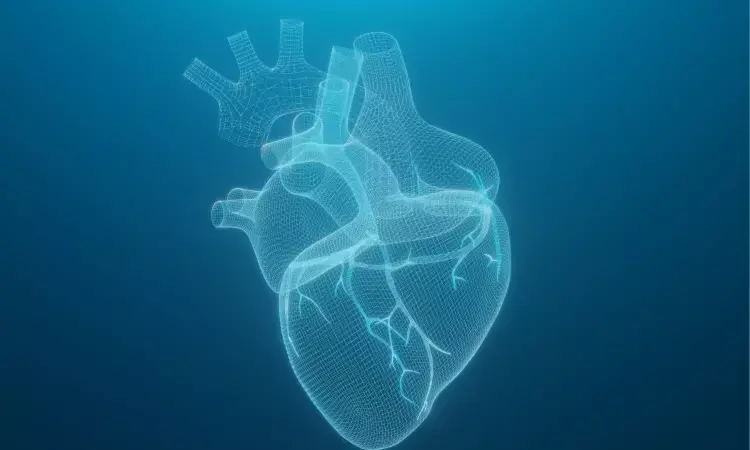- Home
- Medical news & Guidelines
- Anesthesiology
- Cardiology and CTVS
- Critical Care
- Dentistry
- Dermatology
- Diabetes and Endocrinology
- ENT
- Gastroenterology
- Medicine
- Nephrology
- Neurology
- Obstretics-Gynaecology
- Oncology
- Ophthalmology
- Orthopaedics
- Pediatrics-Neonatology
- Psychiatry
- Pulmonology
- Radiology
- Surgery
- Urology
- Laboratory Medicine
- Diet
- Nursing
- Paramedical
- Physiotherapy
- Health news
- Fact Check
- Bone Health Fact Check
- Brain Health Fact Check
- Cancer Related Fact Check
- Child Care Fact Check
- Dental and oral health fact check
- Diabetes and metabolic health fact check
- Diet and Nutrition Fact Check
- Eye and ENT Care Fact Check
- Fitness fact check
- Gut health fact check
- Heart health fact check
- Kidney health fact check
- Medical education fact check
- Men's health fact check
- Respiratory fact check
- Skin and hair care fact check
- Vaccine and Immunization fact check
- Women's health fact check
- AYUSH
- State News
- Andaman and Nicobar Islands
- Andhra Pradesh
- Arunachal Pradesh
- Assam
- Bihar
- Chandigarh
- Chattisgarh
- Dadra and Nagar Haveli
- Daman and Diu
- Delhi
- Goa
- Gujarat
- Haryana
- Himachal Pradesh
- Jammu & Kashmir
- Jharkhand
- Karnataka
- Kerala
- Ladakh
- Lakshadweep
- Madhya Pradesh
- Maharashtra
- Manipur
- Meghalaya
- Mizoram
- Nagaland
- Odisha
- Puducherry
- Punjab
- Rajasthan
- Sikkim
- Tamil Nadu
- Telangana
- Tripura
- Uttar Pradesh
- Uttrakhand
- West Bengal
- Medical Education
- Industry
Treatment of STEMI patients with P2Y12 Inhibitor before hospitalization may not improve MACE

Pre-treating STEMI (ST-segment elevation myocardial infarction) patients with P2Y12 inhibitors before hospitalisation does not reduce the risk of major adverse cardiovascular or cerebrovascular events, according to a study published in JACC: Cardiovascular Interventions.
This study aimed to compare the outcomes of STEMI patients receiving immediate or delayed P2Y12 inhibitor treatment, as evidence to support immediate P2Y12 inhibitor loading in these cases is limited.
Researchers stratified STEMI patients in the Bern-PCI registry between 2016 and 2020 into two cohorts based on P2Y12 inhibitor pretreatment. In cohort 1 (2016-2018), immediate P2Y12 inhibitor treatment was recommended, while in cohort 2 (2018-2020), it was recommended after confirming coronary anatomy. The primary endpoint was a composite of major adverse cardiac or cerebrovascular events (MACCEs) at 30 days. Sensitivity analysis included only patients who followed these recommendations.
Key summary points from this study are:
- Cohort 1 and Cohort 2 had 1,116 and 847 of mean age 65 ± 13 years, and 24% were female patients, respectively.
- In Cohort 1, pretreatment was given in 708 patients, while in Cohort 2, pretreatment was withheld in 798.
- Between the groups, the baseline characteristics were well-balanced.
- The median difference for P2Y12 loading to angiography was 52 minutes between cohorts 1 and 2 and 100 minutes between patients receiving vs not receiving pretreatment. Rates of MACCEs were similar between cohort 1 and cohort 2 (10.1% vs 8.1%; adjusted HR: 0.91; 95% CI: 0.65-1.28; P = 0.59) and between patients receiving vs not receiving pretreatment (7.1% vs 8.4%; adjusted HR: 1.17; 95% CI: 0.78-1.74; P = 0.45).
They said that in this cohort study of patients with STEMI undergoing primary percutaneous coronary intervention, we found that P2Y12 inhibitor pretreatment was not associated with improved MACCEs.
Reference:
Rohla, M, Ye, S, Shibutani, H. et al. Pretreatment With P2Y12 Inhibitors in ST-Segment Elevation Myocardial Infarction: Insights From the Bern-PCI Registry. J Am Coll Cardiol Intv. 2024 Jan, 17 (1) 17–28.
BDS, MDS in Periodontics and Implantology
Dr. Aditi Yadav is a BDS, MDS in Periodontics and Implantology. She has a clinical experience of 5 years as a laser dental surgeon. She also has a Diploma in clinical research and pharmacovigilance and is a Certified data scientist. She is currently working as a content developer in e-health services. Dr. Yadav has a keen interest in Medical Journalism and is actively involved in Medical Research writing.
Dr Kamal Kant Kohli-MBBS, DTCD- a chest specialist with more than 30 years of practice and a flair for writing clinical articles, Dr Kamal Kant Kohli joined Medical Dialogues as a Chief Editor of Medical News. Besides writing articles, as an editor, he proofreads and verifies all the medical content published on Medical Dialogues including those coming from journals, studies,medical conferences,guidelines etc. Email: drkohli@medicaldialogues.in. Contact no. 011-43720751


